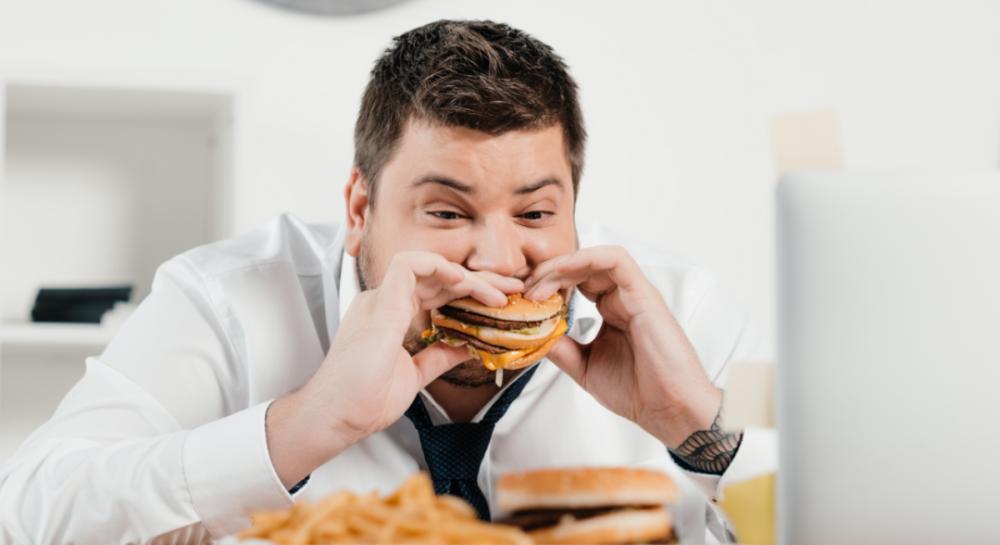Wolf-swallowing easy to get "three highs"
Reporter Of this newspaper, Yan Sheng

In modern society, time is efficiency. Busy work and life sometimes compress our eating time, resulting in eating gobble-ups and quick decisions. In fact, chewing is closely related to health. Recently, the Dental Science Research Group of Niigata University and Osaka University Graduate School in Japan reported in a paper published in the journal Frontiers in Cardiovascular Medicine that chewing less during eating can lead to an increase in the prevalence of metabolic syndrome.
1
Eat fast, the risk of "three highs" is high
The research team targeted nearly 600 residents (254 males and 345 females) aged 50 to 70 years who underwent dental examinations in Fuchida City, Osaka Prefecture, Japan, who underwent dental examinations during health check-ups, and studied the relationship between chewing efficiency and metabolic syndrome by using specially developed gummies and measuring chewing efficiency, and divided them into 4 groups, except for the low-value group, the remaining 3 groups were non-low-value groups, and analyzed and studied the relationship between chewing efficiency and metabolic syndrome.
The results showed that during the average 4.4-year follow-up period, the prevalence of metabolic syndrome in men and 1.14 times in women increased significantly by 2.24 times and women in the low-value group compared with the non-low group of chewing efficiency; in terms of the prevalence of new "three highs", the risk of men was particularly significant, with hypertension increasing by 3.12 times, hypertriglyceridemia increasing by 2.82 times, and hyperglycemia increasing by 2.65 times.
Not long ago, scientists at Waseda University in Japan also published a study in the journal "Scientific Reports", researchers found that chewing slowly can increase the heat production caused by diet, that is to say, as long as you eat slowly, chew more bites, and feel the taste of food, you can consume more calories.
Slow eating and adequate chewing can increase blood circulation in the visceral areas of the abdomen. Researchers at Waseda University in Japan say that while the difference in energy expenditure per meal is small, the cumulative effects of multiple meals 365 days a year are enormous. And increasing metabolism and intestinal movement can help prevent obesity and metabolic syndrome.
2
Eating fast is an independent factor that predisposes diabetes
Previously, a study of nearly 200,000 people conducted by Japanese scholars showed that eating food, eating snacks after dinner or before going to bed, and skipping breakfast increased the risk of diabetes.
The study found that people with diabetes ate quickly, ate snacks after dinner, ate snacks before bedtime, and did not eat breakfast at a higher rate than those who did not have diabetes. In terms of how fast or slow to eat, those who eat fast gain more weight after 20 years and fluctuate greatly in weight within 1 year (≥3 kg). Further analysis shows that eating fast is an independent factor that induces diabetes.
The researchers pointed out that eating too fast does have an impact on the body's glucose tolerance, that is, insulin resistance, which may be related to the fact that it is not easy to eat a feeling of fullness. Studies have shown that people who eat at a normal rate have a 29 percent lower risk of obesity compared to people who eat like a whirlwind, and those who chew slowly and swallow 42 percent less. Obesity and diabetes are also in the shadows.
Another cross-sectional observational study from Italy also suggested that for obese middle-aged people, eating fast, especially lunch and dinner, can significantly increase the risk of abnormal lipid metabolism. People who eat faster have a higher risk of developing type 2 diabetes and abnormal lipid metabolism than people who eat slowly.
3
Chew slowly and swallow, eat eight points full of rice
Beneficial for longevity
Good eating habits are good for health. Another Japanese study of 60,000 people also showed that chewing slowly, eating less snacks after meals, and not lying down for two hours after meals helped to lose weight and keep your waist slender.
So, how to chew when eating is scientific and healthy?
The "Chinese Expert Consensus on Alleviating Type 2 Diabetes" mentions that it is necessary to slow down the speed of eating, increase the number of chews, chew 20 to 40 times per bite, pause between meals, and reduce the amount of food per bite.
In addition to chewing and swallowing, Japanese cultural expert Marcos Cartagena believes that there are 9 reasons for Japanese longevity after studying the lifestyle of centenarians in Okinawa and other places, of which 8 are related to diet.
Therefore, we also need to eat 80% full, eat too much, the digestive process will be too long, the operation of body organs will be slow, and then can not be mobilized to play normal physiological functions.
Low-calorie diets, low-calorie diets over time will show different changes.
Eat more vegetables, fruits and grains; eat less meat; eat seasonal ingredients; and advocate traditional diets.
Enjoy good food, not let the food tired, do not have to deliberately calculate the calories of each bite of food, so as not to create mental stress.
The pictures in this article are from the Internet
Edit || Swallow sound Wan Tao
The duty director || Fan Hongbo